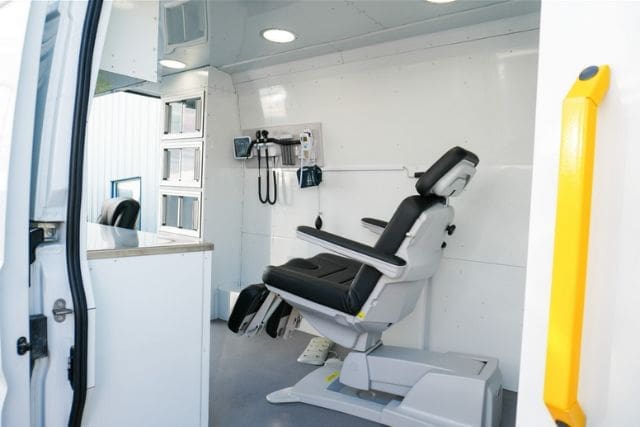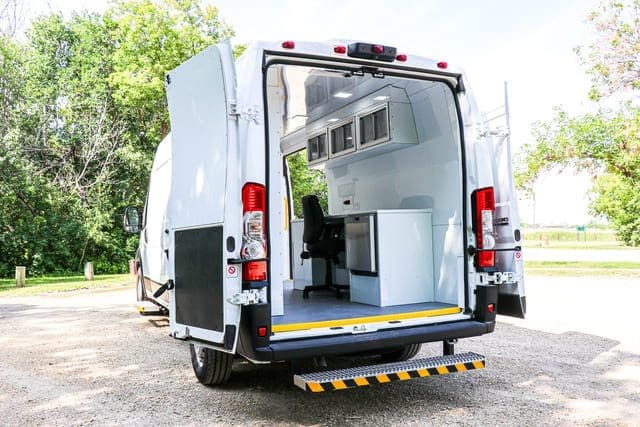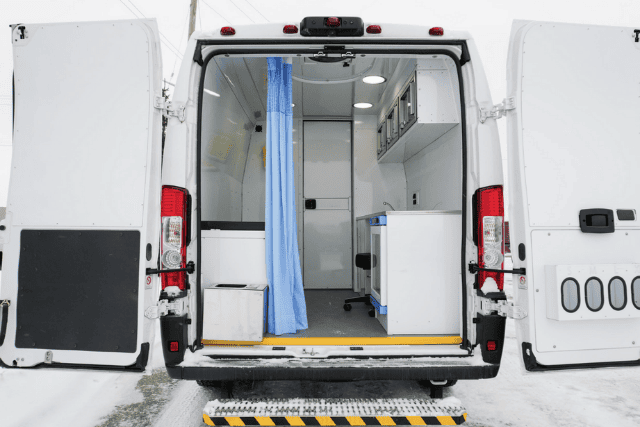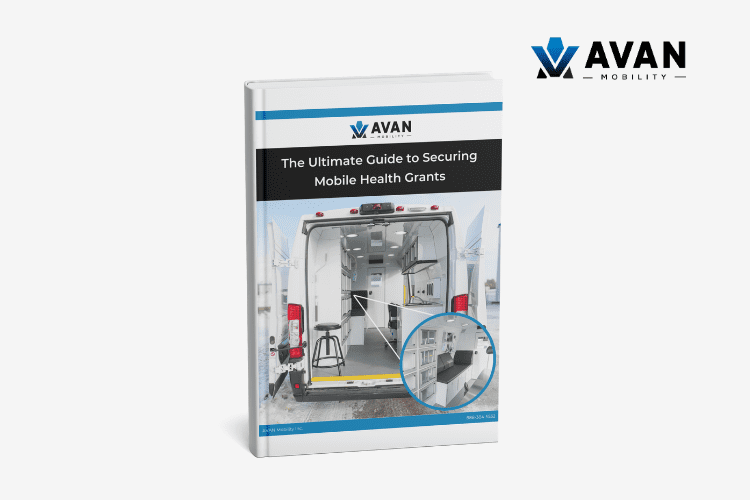Did you know that over 90% of California’s farmworkers are immigrants, and around 55% of them struggle to access healthcare? Right now, thousands of migrant farm workers are working long hours under the sun, often in pain or illness, without access to a doctor.
If your organization is trying to solve this problem, you’re not alone. Making sure migrant farm workers in California get the healthcare they need is important, not just for them but for the well-being of the entire communities around them.
When health issues go untreated, workers miss more days, straining their income and the local economy. But with so many hurdles—like language barriers, immigration status, and a lack of transportation—it’s tough to know where to begin. We get that you’re looking for the right approach to make a real difference.
At AVAN Mobility, we’ve spent over 10 years focused on breaking down barriers to healthcare. We design and build mobile medical vehicles for organizations like yours and Siskiyou County that bring care directly to those who need it most. With our experience, we’ve learned what works. That’s why we’re here to give you honest, practical information to help your organization find the best way forward.
In this article, you’ll discover how to improve healthcare for migrant farm workers in California so they can stay healthy and continue supporting their families and communities. You will also learn how mobile health clinics can be part of the solution.
Top 3 healthcare barriers for migrant farm workers in California
Migrant farm workers in California face a lot of challenges when it comes to getting the healthcare they need. Let’s talk about the top three barriers that make it hard for them to access proper care.
1. Lack of health insurance
Did you know that almost half of all farm workers in California didn’t have adequate health insurance in 2023? Because of this, only 43% visited a medical clinic, and just 35% went to the dentist. Lack of health insurance is the biggest hurdle these workers face. Without insurance, healthcare can be way too expensive, especially on a farm worker’s income.
High costs: Paying out of pocket is tough, so many farm workers only go to the doctor when their health gets really bad.
Skipping preventive care: Without insurance, regular check-ups, vaccines, and dental visits often get skipped, leading to bigger health problems later on.
2. Language and cultural barriers
Language and cultural differences are another major issue. Many migrant farm workers in California mainly speak Spanish or indigenous languages, which can make it hard to communicate with doctors.
Language struggles: It’s tough for farm workers to explain their symptoms or understand medical advice if they don’t speak English well.
Cultural misunderstandings: Different views on health and medicine can create mistrust or confusion between patients and healthcare providers.
3. Lack of transportation
Finally, lack of transportation is another big healthcare barrier that migrant farm workers face. Many live in rural areas with little to no public transportation, making it hard to get to a doctor’s office.
Long distances to clinics: Most healthcare services are located in cities, far from the rural areas where migrant farm workers live and work.
Inconsistent transport: Even if and when public transportation is available, it might not run often enough to fit into a farm worker’s busy schedule.
These barriers—lack of health insurance, language and cultural differences, and transportation challenges—make it really tough for migrant farm workers in California to get the healthcare they need.
Keep reading to learn how a mobile health clinic can improve healthcare for migrant farm workers in California.
How do you overcome healthcare barriers for migrant farm workers in California?
A mobile health clinic can make a big difference in getting healthcare to migrant farm workers in California. Let’s talk about how it helps tackle each of the barriers we’ve mentioned.

1. Helping with lack of health insurance
A mobile health clinic can offer affordable, sometimes even free, healthcare services right where farm workers are. Many mobile clinics team up with community organizations or government programs to provide low-cost care. This means farm workers can get the medical attention they need without stressing about expensive bills.
Affordable care: Mobile clinics often provide services at little to no cost.
On-site treatment: Workers don’t have to travel far to get the help they need.
Check out the video below of an organization in Joplin that purchased a Mobile Clinic Van from us. Most of their patients aren’t insured, and your organization could do the same thing in California.
2. Bridging language and cultural gaps
Mobile health clinics often have bilingual staff and healthcare providers who understand the cultural backgrounds of the farm workers they serve. This makes it easier for workers to share their health concerns and feel understood. Plus, these clinics can tailor their services to be culturally sensitive, which helps build trust.
Bilingual staff: Migrant farm workers can communicate in their preferred language, like Spanish.
Culturally sensitive care: Clinics can offer services that respect workers’ cultural beliefs and practices.
3. Solving transportation problems
When healthcare comes directly to the farm, transportation issues disappear. A mobile health clinic can travel to where the workers live and work, reaching those in remote areas who might not otherwise see a doctor. This makes accessing healthcare much easier for farm workers.
On-site care: Clinics go directly to the workers, not the other way around.
Reaching remote areas: There is no longer a need for long trips to distant healthcare centers. Farm workers don’t have to worry about finding transportation to visit a doctor.
What types of vehicles can be used as mobile health clinics?
When it comes to creating a mobile health clinic, several types of vehicles can be converted, including:
Each vehicle has its own pros and cons, depending on your specific needs. At AVAN Mobility, we specialize in converting vans into mobile health clinics because of their versatility. Vans offer a perfect balance of space, mobility, and functionality, making them ideal for reaching remote areas where migrant farm workers live and work.
Features and benefits of the Mobile Clinic Van for migrant farm workers
Here’s a look at some of the key features of our Mobile Clinic Van and how they directly benefit migrant farm workers:
| Feature | Benefit for Migrant Farm Workers |
| Rear Heat & Air Conditioning | Keeps the clinic comfortable in all weather conditions so that workers are at ease during check-ups, whether it’s a hot day in the fields or a chilly morning. |
| Power supply with 12V plug, USB ports, and conventional outlets | Enables the use of necessary medical equipment and lets workers charge their phones, helping them stay connected with family while waiting for care. |
| Options for sink and fridge | Provides a space to safely store medications and offer basic care, such as keeping insulin cool for a diabetic worker or washing hands before a treatment. |
| Floor-to-ceiling cabinetry and overhead storage | Offers ample space to store medical supplies, ensuring that everything needed for various treatments is readily available and organized, even in remote areas. |
| Patient bed with under-bed storage | Allows for comfortable exams, with extra storage for medical supplies, so that workers can receive thorough care without feeling rushed. |
| Office desk space | Provides a workspace for healthcare providers to manage patient records on-site, allowing for immediate documentation of a worker’s health needs. |
| Wipe-clean aluminum surfaces | Wipe-clean surfaces make cleaning and sanitation easy, which is important after treating multiple workers during a busy day in the fields. |
| Bright LED interior lighting | Provides clear visibility for medical procedures, even during early morning or late evening visits when workers are available. |
The combination of these features makes the Mobile Clinic Van a practical and highly effective tool in delivering healthcare services directly to migrant farm workers in California.
Ready to improve healthcare for migrant farm workers?
You came to this article looking for ways to improve healthcare access for migrant farm workers in California. After reading, you’ve learned about the biggest barriers they face—lack of health insurance, language and cultural differences, and transportation issues—and how mobile health clinics can help overcome these challenges.
At AVAN Mobility, we care deeply about the work we do because we know it makes a real difference and saves lives. If you have any questions or need some guidance on setting up a mobile health clinic, just click the button below to talk to one of our mobility experts. We’re here to support you every step of the way.
If you’re not quite ready to chat with us, feel free to explore some of our other resources to learn more.
Because organizations often experience funding issues, start by reading our article on how to apply for mobile health grants.
After that, check out our article on the cost of a mobile medical van. If you prefer to find out more about that in video format, watch below!





